 |

The host family
Under the supervision of an instructor from the school the host family looks after the puppy from the age of 2 ½ months to 1 year. The family should be highly motivated and have enough free time available to educate the puppy and take him for regular check ups.
"Sensitization" is really a pre-training period based on the normal development that the puppy goes through in order to find his place in the pack hierarchy, in this case his host family.
At about 1 year of age he will begin to wear a harness and go to the school for more specific training.
The host family plays an important role in the education of a guide dog. Even though he belongs to someone else he should be given the care and affection of a regular pet, so that he becomes a stable and well-behaved dog. It should be seen as a mission. The host family has a moral contract to raise the future guide dog correctly. The fact that the dog will eventually lead a blind person should never be forgotten.
The culmination of the bonding and training will be to return a solid dog to the school after a year.
Successfully raising a puppy means that the family has played a big part in making a blind person happy!
What is a host family ? What does it do ? |
By volunteering to raise a future guide dog the host family brings a blind person closer to leading an independent life.
Not everyone can be a host family. Exclusions include:
- Having to leave the puppy alone for more than 3 hours/day.
- Can not come to school regularlyy
- Owning an aggressive pet.
- Living in an apartment building without an elevator.
|
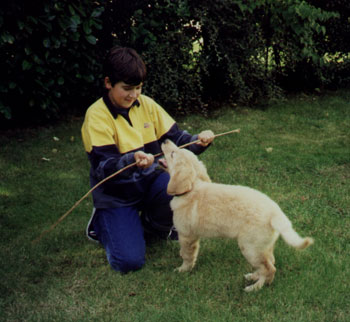 |
The basic role of the family is to raise a well-adjusted puppy. He should be walked regularly, taught to defaecate in the gutter and be given basic obedience training. All traumatic experiences should be avoided. This is all explained to the family by the school.
It is a very rewarding experience for children. Not only do they learn what it means to have a pet, the joys and the responsibilities, but they also learn to give of themselves.
The puppy joins the family |
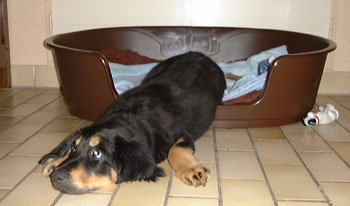 |
It is never easy to decide which puppy to place with what family, despite all the precautions that are taken. In theory every puppy has a perfect host family but in reality it does not always work that way and mistakes do happen. Fortunately they are rare.
Usually all the puppies of a particular litter are placed with their families at the same time, which makes the follow-up easier. It also sets up a friendly rivalry amongst the host families. They get to know each other, share experiences and even act as temporary hosts for the other puppies should the need arise.
The attitude of each member of the family towards the puppy is observed. The family is reminded of the goals of the project and what the puppy's place should be in his new pack. |
It is an important moment when last minute instructions, both practical and written, are given. The puppy enters a new phase in his life. Sometimes it is his first time in the new home and it is important that things go well.
| What is the ideal age to begin educating a puppy? 5 months? 1 year? The answer - as soon as the puppy arrives. By 6 months of age he must have learnt the basics, be familiar with his surroundings and begin to be sociable. All teaching is done gently and naturally. |
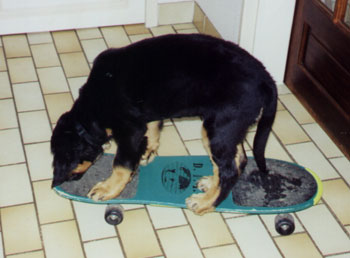 |
His receptiveness is at a peak at this age so one should take advantage of his natural aptitudes. He wants to be close to his master and be affectionate, so these needs should be reinforced. This will serve its purpose later when he is taught to "heel" and "come". At this stage the puppy comes without hesitation when called and will not wander, even when off the leash. His master is his "anchor", a focal point to which he will return frequently when he begins to explore.
He should be motivated with games, treats and his food bowl around meal times. They will all make him eager to learn.
A natural method, the principles are as follows:
- Motivating the dog.
- Provoking a certain behaviour pattern.
- Associating the above with a specific command.
- Positive reinforcement (toy, treat, praise, meal).
| Example, Sit command: show a toy to the puppy by placing it in front of his nose. Then raise it higher and higher above his head as he watches it. At a certain moment the puppy can no longer lift his head any further and will sit down. Say the command "sit" and reward him by either giving him the toy or a treat. Repeat the command. Pat him. |
Not all the work is necessarily motivational. A specific action may simply be reinforced when the dog does it spontaneously.
Example, Sit command:
1. The puppy sits.
2. Give the command so that he associates it with his position.
3. Reinforce with a treat.
|
|
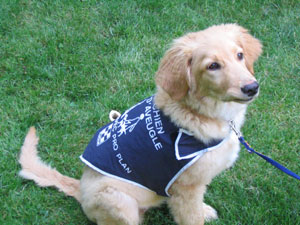 |
The "natural method" was first introduced by J. Ortega.
The dog learns to behave by repeating desirable behaviour because he will be rewarded. On the other hand he will tend not to repeat behaviour patterns that are unpleasant to him, because he will either be scolded or ignored. This is called the "extinction" principle.
The natural method can be applied to any exercise. In all cases the dog should always be rewarded even if he doesn't execute the exercise perfectly. He will eventually learn, by trial and error, and in adulthood easily master these skills when repeated.
This step by step learning allows the dog to easily assimilate new exercises later on in his education.
The exercises should be repeated frequently, but only as long as the puppy shows an interest. Several short sessions are preferable to one long one. Once an exercise has become part of his routine the puppy will remember it and integrate it into his daily life.
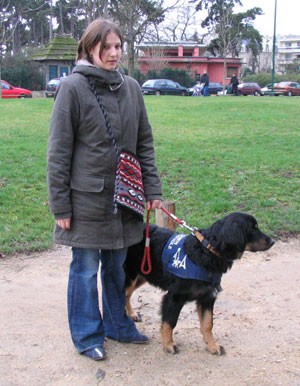 |
The first year is an exciting one as it determines the future of the puppy. The prime object is to give him a sound physical and psychological education, as well as teaching him the basics.
A log book is kept to follow his progress and development.
The first six months:
During this period the families come to the school every fortnight to learn:
- about the puppy's natural behaviour and how he communicates
(hierarchy, pack notion, instincts)
- how he learns
- about animal health
(planning his shots, de-worming and treating other parasites, other health issues)
- play/work management
|
| The host family is expected to continue the intra- and inter-specific socialization of the puppy (stimulation of the visual, tactile, auditory and olfactory senses). The puppy should be taken to different places, e.g. the subway, the market, open spaces, and he should spend as much time as possible with his master. He should be house trained and be taught the basic obedience commands: to walk on a leash, to come, to retrieve, to go to his place. |
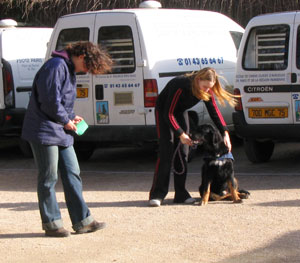 |
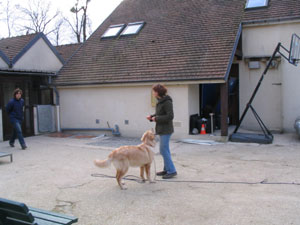 |
During each meeting with the host family the trainer emphasizes these objectives. All exercises are always done jointly with the young dog and the master. |
After the 6th month:
The puppy begins to spend 2 - 3 days a month at the school. A trainer will observe him in different surroundings and begin his specific guide dog training.
This entails:
- Concentration and the concept of work
- Structuring his environment , with commands like "front", "right", "left", "crossing" (= Sit before the pedestrian crossing)...
- the apprenticeship - the dog learns something and is expected to repeat it
This period is so important that 3 different trainers are assigned to teach these tasks.
Returning the puppy to the school |
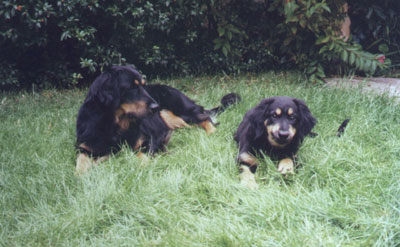 |
This takes place at 1 year of age. Each family prepares itself for this moment: some immediately take another school puppy, some prefer to wait, others take another dog as a pet.
During the six month training period the host family can still take the dog, the first three weekends.
And even once the dog has been handed over to his blind master, some families stay in touch. |
The dog does not seem to suffer from this change of master as the change takes place gradually and the dog is always treated with a lot of love and affection.
The host family and the school |
At the 2 annual reunions the school and the families exchange ideas and they are encouraged in their task.
Some families volunteer during the open houses and keep a stand.
How to become a host family
Do you have free time? Would you love a puppy? Do you want to become a host family?
Just attend a briefing, if you agree to take a puppy this will be arranged as soon as possible.
official website of Paris school, meeting dates
You will be given the food and all veterinary fees are reimbursed by the school.. |
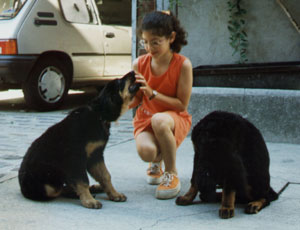 |
Message for future candidates
If you are a caring person, humane, and you love animals, then you will find raising a guide dog a very gratifying experience.
- You may never have had a dog because the fact that he will be with you for 10-15 years has always put you off. Perhaps this is a suitable compromise. You would only have the dog for 10 months and will benefit from the professional support of the school throughout this time.
- If you do decide to take a puppy you will not regret it. You have no idea how proud you will feel when he is finally handed over to a blind person!
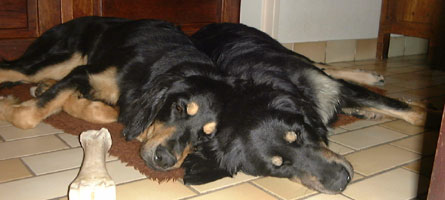
Aren't we great?

|


